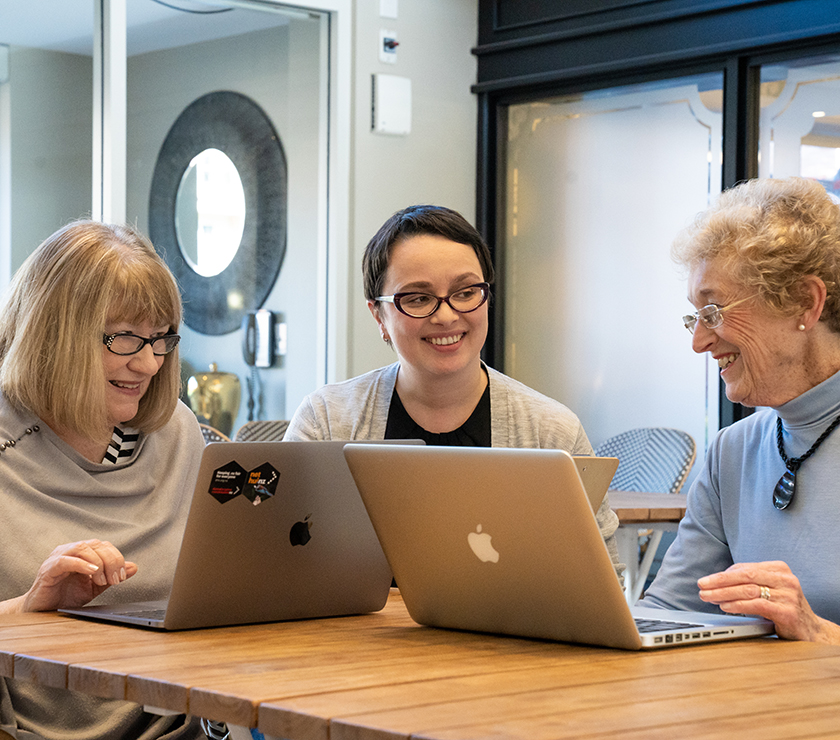Some highlights of research funded by InternetNZ
Ciara Arnot Community Advisor •

Some of our grantees working on research have recently shared an update on their work, and we wanted to give you the lowdown.
A couple of our grantees working on research have recently shared an update on their work, and we wanted to give you the lowdown.
Sociodigital Research, Caroline Keen - Surviving the 'new normal': Seeking sustainable income by raising the digital capital of women over 50'
Early in 2021, Dr Caroline Keen set out to examine digital experiences, capacities, and perceptions about the relevance of digital technology to women over 50, and specifically their future employment.
Most digital inclusion initiatives focus on digital knowledge, expertise, and access among key demographics such as rangatahi, seniors, Māori, and Pasifika. In this research, Dr Keen explored the idea of "digital capital" to understand this digital inclusion issue for an oft-overlooked group. Women in the 50+ age group face issues of reduced work, job loss or business closure. In a world where most of us need to constantly re-skill to maintain digital capital, this demographic faces added pressures that make them disproportionately vulnerable to economic disadvantages, such as ageism, discrimination, supporting dependents, and other commitments.
"Digital capital" is about a person leveraging their existing capital in the online space. For example, these days, having a credible online persona and network might give you an edge when going after that job you've been gunning for. Yet, if you prioritise privacy, maintaining work/life boundaries, or lack the time and energy, you may choose to limit your online presence. This can inadvertently work against you. Within this group, a lifetime's worth of experience, and qualifications, were frequently undervalued by organisations in favour of youth and 'recent knowledge'. Even additional educational investments as mature students did not always result in better quality work or increased remuneration as one might expect.
"Participants' experiences at work, and while looking for work, highlighted that modern organisational culture idealises and prioritises 'youth', and 'recent knowledge' rather than accumulated cultural capital such as tertiary qualifications and experience. This left many feeling undervalued by employers in today's labour market."
Through interviewing women 50-67, with incomes ranging from $24,000 to over $200,000, Dr Keen found valuable insights and provided an empowering experience for research participants.
Key findings
Check out key findings from this and other research projects: https://www.socialresearchnz.com/key-findings
Previous research
Dr Keen's previous research into family digital cultures and how familial attitudes can impact digital inclusion also provides a handy lens for understanding different attitudes towards digital: https://www.socialresearchnz.com/_files/ugd/18eee5_bd098acb4e12497598dd1eaebc1003f8.pdf
AUT, Caroline Qi and Grace Wang, Digital inclusion of migrant owners of small businesses
In early 2020 when researchers at AUT received InternetNZ grant funding and set out to understand the readiness to use internet-based services for the migrant owners of small businesses, it was in response to government priorities around digital inclusion. However, the pandemic added pressure and urgency on migrant owners of small businesses to get online faster, making this research more timely.
Participants in the research faced various obstacles in getting online, including lack of digital skills/knowledge and the small size of businesses making it difficult to have enough budget or investment. That meant many had to figure it out for themselves and learn by doing. There were also personal factors, such as language barriers and concern around misinformation, online scams, bullying and racism — for example Asian participants perceived more barriers in using Internet-based services than Europeans.
Major pain points included doing taxes online, promotion and staying safe. To further implement the digital government initiative, the researchers recommend the following strategies could be considered:
- provide IRD system training for migrant business owners
- set relevant financial support or tax incentive to support small businesses' adoption of Internet-based services and technologies through the partnership among different government agencies (e.g., InternetNZ, MBIE, Inland Revenue)
- organise relevant workshops to address business owners' concerns about using Internet-based services such as safety and security issues, online transactions, digital communication approaches, etc.
Despite challenges, embracing digital technology and incorporating these tools into business was seen as a potential asset and likely to strengthen small businesses in the long run.
Final report
Check out the final report of the Digital inclusion of migrant owners of small businesses research project.
Our funding
Each year InternetNZ uses profits from the sale of .nz domain names to give out community funding. They provide funding for community-led initiatives that extend the availability, use, and benefit of the Internet in Aotearoa.
These initiatives received funding in FY2020 and FY2021.